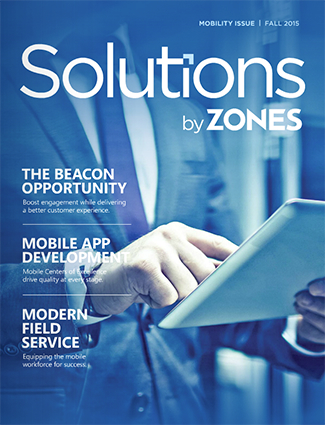1 min read
The future of retail is mobile.
Today’s business owners have seen how profoundly the digital revolution has changed the way they have to interact with their customers, as well as...
3 min read
![]() Zones
:
Sep 2, 2015 6:45:01 AM
Zones
:
Sep 2, 2015 6:45:01 AM

This post appeared as an article in the Fall 2015 edition of Solutions by Zones. Click the image to read more from the magazine.
When you consider the vast number of mobile applications in use, it’s hard to believe that this rapidly advancing technology barely existed a decade ago.
Today’s mobile apps serve a wide range of business functions, as well as forming the very basis of businesses like Uber, Airbnb, and Twitter.
While your business may not reside primarily in the mobile world, it’s likely that your business is leveraging mobile apps or is planning to rollout mobile dashboards, customer service tools, ecommerce applications, or field service applications in the near future.
A key consideration in app development is whether to outsource the project. Gathering the technical resources including researchers, user experience designers, and application developers can be time consuming and expensive.
On the other hand, outsourced web development organizations can deliver results much more quickly and eliminate your need to staff up, but may lack important business or cultural knowledge.
One of the most critical issues in mobile application development is planning. Too often, a senior executive calls on IT to build a mobile app that addresses an immediate business need and, in an effort to respond quickly, IT cobbles together a one-dimensional solution that consumes a tremendous amount of resources in relation to the app’s true business value.
Whether you choose to build or buy application development capability, a solution to the rapid response model described above is the creation of a Mobile Center of Excellence (MCoE).
MCoEs are increasingly common in the enterprise today. At the most basic level, an MCoE is a carefully curated team of people who represent disciplines or divisions that have either a stake in or expertise in specific aspects of a process or initiative. The role of the MCoE is to promote collaboration and best practices to deliver a result that successfully achieves the desired outcomes for all constituencies.
The MCoE’s secondary role is to serve as strategic advisor to the business on an ongoing basis, providing insight and clarity on its area of expertise to leadership. A well-structured MCoE brings together internal and in some cases external resources to ensure key areas beyond an app’s business functionality, such as security, mobile device management, device selection, and the existing infrastructure are considered prior to development. Failure to coordinate all of these activities and systems in a holistic fashion risks incompatibility and suboptimal functionality of the overall solution.
Whether the goal is to build a web app, which is essentially a website that is stored on a server and delivered over the Internet via a browser; a native app that provides enhanced interaction via the browser on a user’s device; or a hybrid app which runs inside a native container on the device by leveraging the browser engine but not the browser itself, the app’s functionality and value to the business must both be addressed during its development.
A mobile web app can be a good choice for a straight forward app that simply accesses and displays information from a database or Web service. If you need to manipulate data or on a higher level, such as field-worker applications, you should be thinking about a native or hybrid app, as these support a more interactive user experience. Likewise, you’ll want to build a native or hybrid app if your app is to operate offline, since a Web app requires connection to the web to function.
From the business leader’s point of view, the specific type of application that gets the job done is not the primary concern; the focus there is going to be the resulting app’s functionality. The job of the MCoE is to understand the business purpose of the proposed application from the business leader’s point of view, and then gather the operational and technical resources necessary to build the app, apply best practices, and deliver it.
With an MCoE in place, all key constituencies have their advocates from the outset. This greatly increases the likelihood of success. Business leaders’ goals for the project will come into alignment with technical and budgetary considerations early on, and any necessary adjustments to cost or capability can be made intelligently and in a timely manner.
As development progresses, the very existence of the MCoE means that all stakeholders will be kept up to date on milestones achieved, and more importantly, will quickly be made aware of any deviations from the plan.
The structure and size of your MCoE will depend largely on the size of your organization. In a mature company with significant business and technical resources, the MCoE should include representatives from many areas, and might include key sales, marketing and operations leaders in addition to the web, design, mobile, and IT leaders who will be responsible for delivering it. For many others, the MCoE will include fewer individuals, and may leverage outside developers for execution. In either case, the goal of the MCoE remains the same.
For many organizations, it makes sense to give a dedicated web development partner a seat on the MCoE. By engaging their services, your MCoE can access the technical expertise necessary to manage complex line of business projects that leverage multiple vendors and tie into your back-end technologies in the most efficient way.
Leveraging relationships with some of the largest mobile application development organizations in the industry, Zones can connect you to a resource capable of guiding the MCoE and delivering a product built with its goals in mind. The result can be the accelerated and more efficient development of a higher quality mobile application that delivers greater functionality, enhanced usability, and longer refresh cycles.
A Zones account executive can help you evaluate the best application development partner to support your MCoE.

1 min read
Today’s business owners have seen how profoundly the digital revolution has changed the way they have to interact with their customers, as well as...

The unfortunate truth is that workplace modernization is a more nebulous process right now than it’s ever been. Everything used to be so simple –...

The most difficult aspect of workplace modernization these last two years, as businesses have adjusted to a global pandemic and a new, remote way...